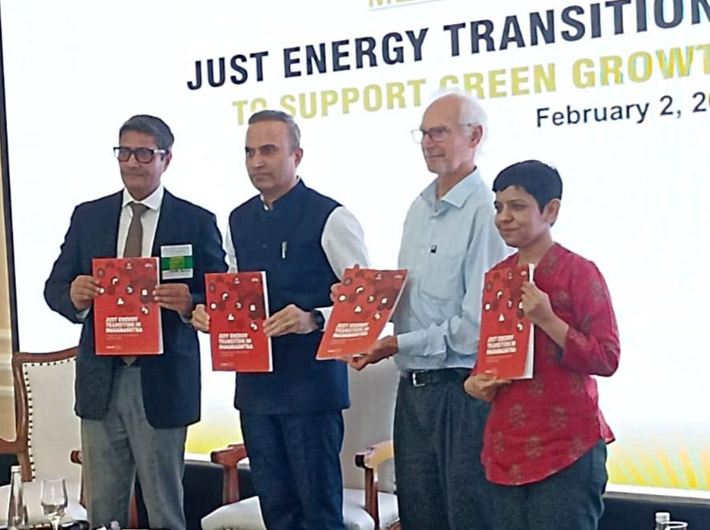The state has 10% of country’s GHG emissions, coal mining, coal-based power, points out new report
With largest coal-based thermal power fleet and automobile manufacturing and the third largest number of factories directly dependent on fossil fuels in the country, Maharashtra accounts for 10% of India’s GHG emissions.
The state is crucial to achieve India’s climate targets including the Net Zero target by 2070; its economy is also vulnerable to energy transition as over 40% of factories will be highly or moderately impacted due to the energy transition.
A report, ‘Just Energy Transition in Maharashtra: An Opportunity for Green Growth and Green Jobs’, released by The International Forum for Environment, Sustainability and Technology (iFOREST) here on February 2, says that coal mining, coal-based power and automobile are the top three sectors that will face challenges within the next 10 years and soon require just transition plans.
Green energy transition will affect coal mining, thermal power, refineries, and 41% of all factories operating in Maharashtra. The transition of these sectors and industries will impact over 1.0 million formal workers in coal mining, thermal power, refineries, and fossil-fuel dependent factories that will be impacted over the next two decades. They will require skilling/reskilling and other transition support. Besides, a large number of low-paid informal workers will be impacted, including about 0.25 million in the brick-making sector.
According to the report, 14 districts – Nagpur, Chandrapur, Yavatmal, Pune, Nashik, Aurangabad, Ahmednagar, Kolhapur, Sangli, Solapur, Palghar, Raigad, Thane and Mumbai Suburban (including Mumbai city) – are the transition hotspots. These districts account for 100% of the coal mines, oil refineries, and fertilizer plants. Besides, they account for 65% of the coal-based TPP units, 75% of the automobile and auto-component enterprises, 77% of the steel units, over 60% of the cement units, and about 78% of the boilers. These districts also cover all five brick-making clusters.
The report is a first comprehensive assessment on challenges and opportunities of a just energy transition in the state and covers all major sectors that will be highly or moderately impacted by the green energy transition.
“An important aspect of the just energy transition will be the support to micro, small and medium enterprises (MSMEs),which dominate the auto component segment, foundries, and industrial units using boilers, among others. These enterprises employ a large number of formal and informal workers,” says the report.
“For the state government it will be important to develop a comprehensive State Just Transition Policy. The policy should focus on economic diversification, workforce skilling and development, and investments in social and physical infrastructure to build social capital and attract investments.
“The State Government should develop Regional Just Transition Plans to prioritize investments and interventions for the hotspot regions. The priority regions for developing such plans are the Chandrapur-Nagpur-Yavatmal cluster and Pune cluster,” it says.
The report says that for reskilling of workers and preparing the future workforce both the government and industry will need to massively scale-up skilling and re-skilling programmes and allocations to retain local employment.
Green construction and green infrastructure development, green energy, green mobility, and technical training for repurposing and decommissioning activities will be some areas requiring skilling.
Speaking at the report release Pravin Darade, principal secretary, Department of Environment and Climate Change, Government of Maharashtra, said, “Maharashtra has a target of achieving trillion-dollar economy. It is certainly a challenge to achieving a net zero target along with economic growth. Therefore, we need to start transition to green energy.”
Avinash Dhakne, member secretary, State Pollution Control Board, said, “Identifying sustainable solutions is vital for the green transition as well as for environment. Resource availability and costs remain crucial constraints at the moment. However, it is also an opportunity for innovation and entrepreneurship.”
“Green transition will require big investments in the coming years. The industry and capital market and even public funds will have a key role to play. The District Mineral Foundation (DMF) funds available with coal districts provide an immediate opportunity. There is over Rs 1,600 crore of unspent DMF funds with the 3 coal districts that can be used to kick-start transition measures,” said Chandra Bhushan, CEO, iFOREST.
“The state government has already taken proactive initiatives such as state climate action plan, net zero carbon emissions in 43 cities by 2040 and Majhi Vasundhara. The state can lead the way in just energy transition in India by implementing actionable plans in hotspot districts and states,” he added.

